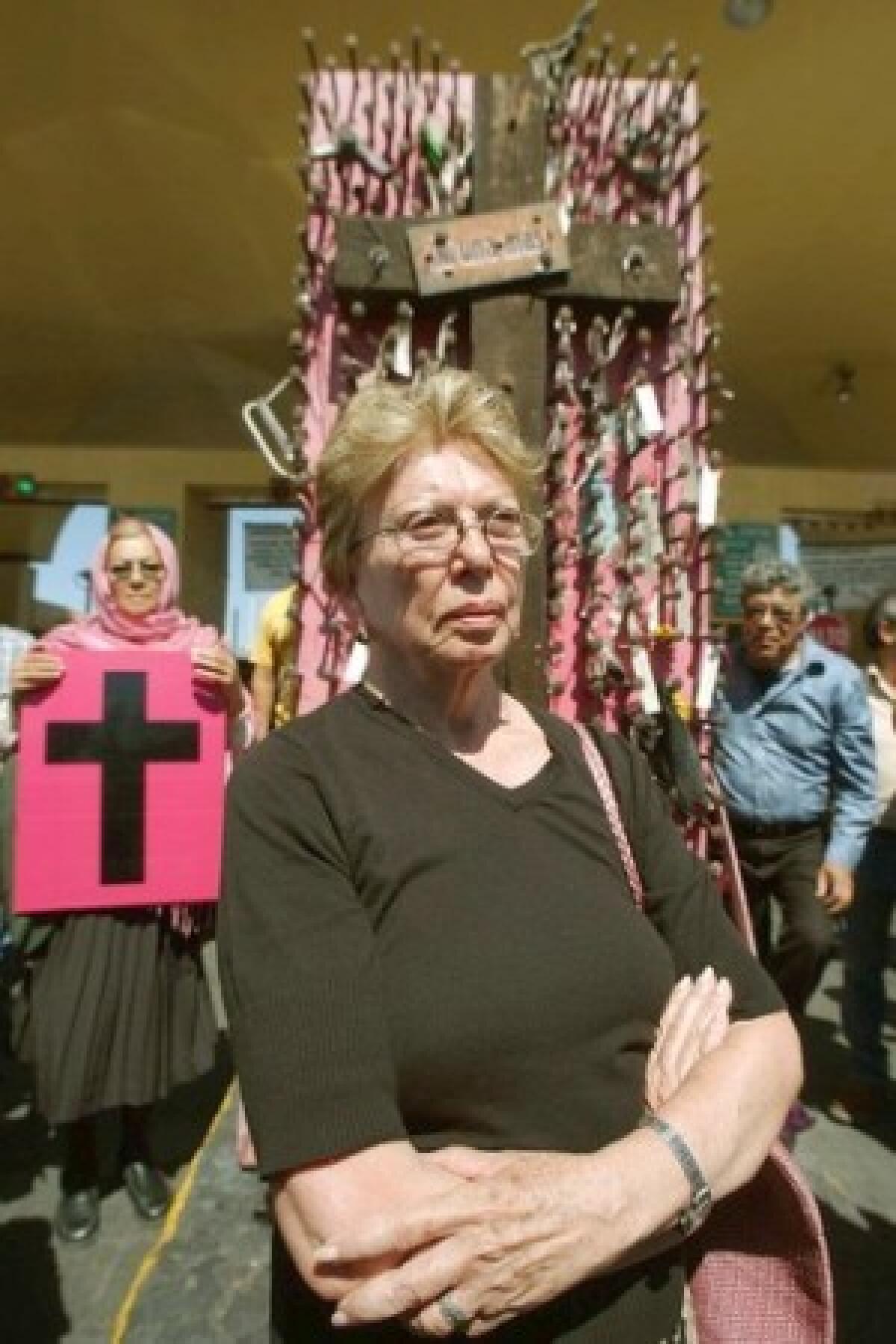Esther Chavez dies at 76; activist decried murders of women in Ciudad Juarez

- Share via
Reporting from Mexico City — Esther Chavez, a vocal champion of human rights who against enormous odds drew attention to the killings and rapes of hundreds of women in the violent border city of Juarez, has died. She was 76.
Chavez died early Christmas morning of cancer, her hometown newspaper El Diario reported Saturday on its website.
Chavez is widely acknowledged as a pioneer, the first activist to document and decry the 1990s murders of several hundred women. Most were young, poor workers in U.S.-owned assembly plants in the border city whose deaths were largely ignored by authorities.
A former accountant for an American food-processing company, Chavez began compiling files in 1993 on women whose bloodied, battered bodies kept turning up in the harsh desert surrounding Ciudad Juarez, across the border from El Paso. She badgered officials, pressured police, comforted victims’ families, led street demonstrations and, in 1999, founded the first rape crisis center in the region.
Juarez politicians were dismissive; they didn’t want to do anything that might damage business with the maquiladoras, or assembly plants clustered mainly along the border, and their U.S. and Japanese owners. Police, notoriously corrupt, were uninterested. Most of the dead women were migrants from other parts of Mexico, so they had no local family to advocate on their behalf. They had only Chavez.
Early in her activism, Chavez speculated that the tendency of the maquiladoras to hire women (smaller hands were better for the assembly work, it was argued by the companies) may have contributed to a macho backlash that explains some of the killings.
“Women are occupying the space of men in a culture of absolute dominance of men over women,” she told The Times in 1999. “This has to provoke misogyny.”
For years, it seemed in Ciudad Juarez that men could snatch young women from the streets with impunity, rape and kill them and suffer no consequence. The phenomenon came to be known as “femicide” -- woman-killing. Thanks largely to Chavez and a few other activists, a handful of arrests were made over the years. But the killing never really stopped, and most cases went unsolved.
Petite and persistent, Chavez opened Casa Amiga in 1999 for rape victims, and it later developed into a center for women suffering from domestic abuse. She remained highly critical of the complicity or inefficiency of police and other authorities.
In 2008, Chavez won Mexico’s National Human Rights Award, and just a few months ago she blasted the decision of President Felipe Calderon to name Arturo Chavez Chavez as national attorney general. Arturo Chavez Chavez had served as state prosecutor overseeing Ciudad Juarez at the height of the killings.
Early this month, in what may have felt like vindication for Esther Chavez, the Inter-American Court of Human Rights ruled that Mexico violated human rights conventions by failing to adequately investigate the murders of three women in Ciudad Juarez in 2001. The court ordered Mexico to pay more than $200,000 to each of the victims’ families.
Lydia Cacho, a journalist and activist who has gained fame denouncing pedophile and human-trafficking rings, said Chavez was a “nurturing and loving mother” for a generation of human rights defenders, and an “international beacon” shedding light on the brutalities of Ciudad Juarez.
“She was the one who showed us the way,” Cacho wrote Saturday in El Universal newspaper. “It was Esther who intuited that the symbolic sewers [of Mexico] were not underground, under the streets, but were the institutions of the Mexican state -- men capable of murdering for pleasure and for power.”
Chavez was the model for a character in “El Traspatio,” a movie about the killings of women in Juarez that is Mexico’s Academy Award entry this year. In the movie, a middle-aged social worker hounds the city police, showing up periodically with boxes full of photos of dead women and meticulous reports on their lives and deaths.
Chavez was born in 1933 in the city of Chihuahua, in the state of Chihuahua where Ciudad Juarez is also located. She moved to Juarez in the 1980s.
On the Casa Amiga website, Chavez wrote about her decision to fight on behalf of women.
“The voice of the woman is a reflection of her condition on Earth,” she wrote. “Air echoes in a chest that is smaller, vibrates vocal cords that are smaller and that produce a higher, thinner sound. It requires twice the energy, twice the intensity of a man’s voice” to be heard.
“This is why I learned to shout for those who couldn’t . . . and to cry so many times for and with so many women, girls and boys whose voices and whose lives have been crushed by the impunity of our state and our nation.”
Survivors include a brother. A memorial service was held Saturday and another will take place today in the offices of Casa Amiga. Chavez will be cremated today, El Diario reported.
More to Read
Start your day right
Sign up for Essential California for the L.A. Times biggest news, features and recommendations in your inbox six days a week.
You may occasionally receive promotional content from the Los Angeles Times.







